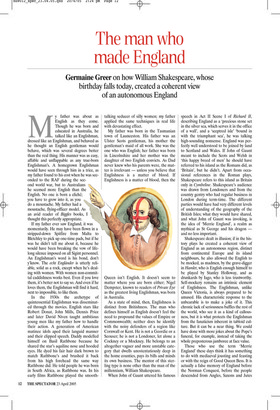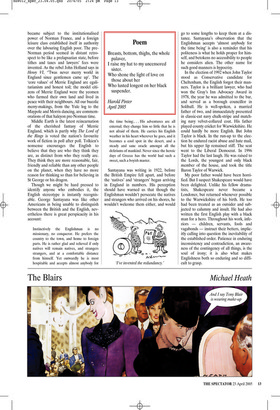The man who made England
Germaine Greer on how William Shakespeare, whose birthday falls today, created a coherent view of an autonomous England My father was about as English as they come. Though he was born and educated in Australia, he talked like an Englishman, dressed like an Englishman, and behaved as he thought an English gentleman would behave, which was several degrees better than the real thing. His manner was as easy, affable and unflappable as any true-born Englishman’s. A homegrown Englishman would have seen through him in a trice, as my father found to his cost when he was seconded to the RAF during the sec ond world war, but to Australians he seemed more English than the English. No one is born a cliché; you have to grow into it, as you do a moustache. My father had a moustache, flying-officer model. As an avid reader of Biggles books, I thought this perfectly appropriate.
If my father ever saw England, it was momentarily. He may have been flown in a stripped-down Spitfire from Malta to Bletchley to pick up one-time pads, but if he was he didn’t tell me about it, because he would have been breaking the vow of lifelong silence imposed on all Sigint personnel. An Englishman’s word is his bond, don’t y’know. The echt Engländer is utterly reliable, solid as a rock, except when he’s dealing with women. With women non-committal caddishness works best. Even if you love them, it’s better not to say so. And even if he loves them, the Englishman will find it hard, next to impossible, to like them.
In the 1930s the archetype of quintessential Englishman was disseminated through the movies. English stars like Robert Donat, John Mills, Dennis Price and later David Niven taught ambitious young men like my father how to handle their action. A generation of American matinee idols aped their languid manner and their clipped speech. Daddy modelled himself on Basil Rathbone because he shared the star’s aquiline nose and hooded eyes. He dyed his fair hair dark brown to match Rathbone’s and brushed it back from his high forehead the same way Rathbone did. He told people he was born in South Africa, as Rathbone was. In his early films Rathbone played the smooth talking seducer of silly women; my father applied the same techniques in real life with devastating effect.
My father was born in the Tasmanian town of Launceston. His father was an Ulster Scots gentleman, his mother the gentleman’s maid of all work. She was the one who was English; her father was born in Lincolnshire and her mother was the daughter of two English convicts. As Dad never knew who his parents were, the matter is irrelevant — unless you believe that Englishness is a matter of blood. If Englishness is a matter of blood, then the Queen isn’t English. It doesn’t seem to matter where you are born either; Nigel Dempster, known to readers of Private Eye as the greatest living Englishman, was born in Australia.
As a state of mind, then, Englishness is distinct from Britishness. The man who defines himself as English doesn’t feel the need to propound the values of Empire or Commonwealth; neither does he identify with the noisy defenders of a region like Cornwall or Kent. He is not a Geordie or a Scouser; he is not a Londoner, let alone a Cockney or a Mockney. He belongs to an altogether vaguer and more unstable category that dwells unostentatiously deep in the home counties, pays its bills and minds its own business. The mentor of this sterling type is none other than the man of the millennium, William Shakespeare.
When John of Gaunt uttered his famous speech in Act II Scene I of Richard II, describing England as a ‘precious stone set in the silver sea, which serves it in the office of a wall’, and a ‘sceptred isle’ ‘bound in with the triumphant sea’, he was talking high-sounding nonsense. England was perfectly well understood to be joined by land to Scotland and Wales. If John of Gaunt meant to include the Scots and Welsh in ‘this happy breed of men’ he should have referred to his island as the Romans did, as ‘Britain’, but he didn’t. Apart from occasional references in the Roman plays, Shakespeare refers to this island as Britain only in Cymbeline. Shakespeare’s audience was drawn from Londoners and from the country gentry who had regular business in London during term-time. The different parties would have had very different levels of understanding of the geography of the British Isles; what they would have shared, and what John of Gaunt was invoking, is the idea of ‘Merrie England’, a realm as mythical as St George and his dragon and no less important.
Shakespeare dealt in illusion; if in the history plays he created a coherent view of England as an autonomous region, distinct from continental Europe and its island neighbours, he also allowed the English to be mocked, as madmen, by the grave-digger in Hamlet, who is English enough himself to be played by Stanley Holloway, and as drunkards by Iago, who is less trustworthy. Self-mockery remains an intrinsic element of Englishness. The Englishman, unlike Queen Victoria, is always prepared to be amused. His characteristic response to the unbearable is to make a joke of it. This chronic lack of seriousness baffles the rest of the world, who see it as a kind of callousness, but it is what protects the Englishman from the fanaticism inherent in tabloid culture. But it can be a near thing. We could have done with more jokes about the Pope’s funeral, for example, instead of taking the whole preposterous jamboree at face value.
Those who use the term ‘Merrie England’ these days think it has something to do with mediaeval jousting and feasting or with the reign of Good Queen Bess. It is actually a false memory of England before the Norman Conquest, before the people descended from Angles, Saxons and Jutes became subject to the institutionalised power of Norman France, and a foreign leisure class established itself in authority over the labouring English poor. The preNorman period seemed in distant retrospect to be like a prelapsarian state, before tithes and taxes and lawyers’ fees were invented. As the rebel John Holland says in Henry VI, ‘’Twas never merry world in England since gentlemen came up’. The ‘core values’ of Merrie England are egalitarianism and honest toil; the model citizens of Merrie England were the yeomen who farmed their own land and lived in peace with their neighbours. All our bucolic merry-makings, from the Yule log to the Maypole and Morris dancing, are commemorations of that halcyon pre-Norman time.
Middle Earth is the latest reincarnation of the cherished fantasy of Merrie England, which is partly why The Lord of the Rings is voted the nation’s favourite work of fiction in poll after poll. Tolkien’s nonsense encourages the English to believe that they are who they think they are, as distinct from who they really are. They think they are more reasonable, fair, friendly and reliable than any other people on the planet, when they have no more reason for thinking so than for believing in St George or his dragon.
Though we might be hard pressed to identify anyone who embodies it, the English stereotype is instantly recognisable. George Santayana was like other Americans in being unable to distinguish between the British and the English, nevertheless there is great perspicacity in his account:
Instinctively the Englishman is no missionary, no conqueror. He prefers the country to the town, and home to foreign parts. He is rather glad and relieved if only natives will remain natives, and strangers strangers, and at a comfortable distance from himself. Yet outwardly he is most hospitable and accepts almost anybody for the time being; ... His adventures are all external; they change him so little that he is not afraid of them. He carries his English weather in his heart wherever he goes, and it becomes a cool spot in the desert, and a steady and sane oracle amongst all the deliriums of mankind. Never since the heroic days of Greece has the world had such a sweet, such a boyish master.
Santayana was writing in 1922, before the British Empire fell apart, and before the ‘natives’ and ‘strangers’ began arriving in England in numbers. His perception should have warned us that though the Englishman wouldn’t persecute the natives and strangers who arrived on his shores, he wouldn’t welcome them either, and would go to some lengths to keep them at a distance. Santayana’s observation that the Englishman accepts ‘almost anybody for the time being’ is also a reminder that his politeness is what he holds proper for himself, and betokens no accessibility to people he considers alien. The other name for such good manners is hypocrisy.
In the election of 1992 when John Taylor stood as Conservative candidate for Cheltenham, the English forgot their manners. Taylor is a brilliant lawyer, who had won the Gray’s Inn Advocacy Award in 1978, the year he was admitted to the bar, and served as a borough councillor in Solihull. He is well-spoken, a married father of two, and immaculately presented in classic-cut navy chalk-stripe and matching navy velvet-collared coat. His father played county cricket for Warwickshire. He could hardly be more English. But John Taylor is black. In the run-up to the election he endured racist abuse and hate mail, but his upper lip remained stiff. The seat went to the Liberal Democrat. In 1996 Taylor had the last laugh. He was raised to the Lords, the youngest and only black member of the house, and took the title Baron Taylor of Warwick.
My poor father would have been horrified. But I suspect Shakespeare would have been delighted. Unlike his fellow dramatists, Shakespeare never became a Londoner, but returned whenever possible to the Warwickshire of his birth. He too had been treated as an outsider and subjected to calumny and insult. He had also written the first English play with a black man for a hero. Throughout his work, inferiors — children, servants, fools and vagabonds — instruct their betters, implicitly calling into question the inevitability of the established order. Patience in enduring inconsistency and contradiction, an awareness of the contingency of all things, is the soul of irony; it is also what makes Englishness both so enduring and so difficult to grasp.




















































 Previous page
Previous page